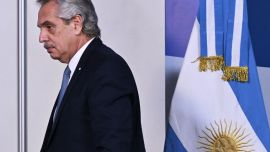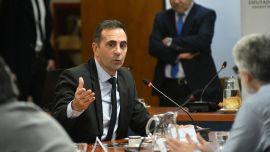Argentina has decided to push back a series of loan repayments due in July to the International Monetary Fund and unify them into a single transaction, Economy Ministry sources said Thursday.
Echoing a similar manoeuvre it undertook in June, President Alberto Fernández’s government will make the payment before the end of the month, as is the nation’s right, the IMF also confirmed.
Argentina did the same last month, paying a debt of US$2.7 billion partly in Chinese yuan and IMF special drawing rights (SDRs) with the Central Bank facing a shortage of international currency reserves.
"The authorities have exercised their right as a member to pool three repayments due in July and pay them at the end of the month (i.e. 31 July)," an IMF spokesperson told Noticias Argentinas news agency.
Argentina owes the multilateral lender a total of US$2.6 billion this month, including US$1.3 billion due Friday, July 7.
The decision to unify and clear the maturities was taken as talks with the multilateral lender continue over the relaxation of targets outlined in its US$44.5-billion credit programme.
Under the terms of the extended fund facility deal, Argentina is due to pay US$1.3 billion on July 7, US$647 million on July 14 and another US$680 million on July 28.
The country is also set to make payments worth US$751 million in August, US$913 million in September and US$2.6 billion in October. A further US$666 million is due in November and US$913 million in December.
Argentina is awaiting a new disbursement of SDRs, tappable government reserves at the IMF, which would help cancel the maturities.
Earlier this year, President Fernández’s government secured a fresh currency swap line with China worth 130 billion yuan (around US$19 billion). The agreement was an extension of an existing deal first signed in 2009 which has since been renewed by multiple governments.
According to the Central Bank’s latest balance sheet, international reserves total some US$27 billion, although the monetary body did not specify the level of net reserves, which private analysts estimate to be in the red.
International reserves stood at US$44.608 billion on January 2.
Argentina’s IMF agreement includes a commitment to reduce the fiscal deficit to 1.9 percent in 2023 and 0.9 percent in 2024, but the country is facing a historic drought that has slashed some US$20 billion off foreign exchange earnings from agricultural exports.
Negotiations
In the meantime, talks are ongoing between government officials and IMF staff over a revision of the country’s debt deal, but differences persist.
Officials from the Economy Ministry this week postponed a trip to Washington for face-to-face talks with Fund staff, with details of the new programme still being negotiated.
A delegation headed by Economy Minister Sergio Massa’s second-in-command, Gabriel Rubinstein, and chief advisor Leonardo Madcur was to travel to Washington this week for meetings, but, as substantial differences persist between the two sides, the trip has been postponed.
IMF Communications Director Julie Kozack confirmed last week that the Fund’s staff and Argentine authorities are still locked in talks intending to reach “agreement on the fifth review of the programme.”
Economy Minister Sergio Massa, who recently confirmed he would run for president, has been briefing the press for weeks that a deal is close.
Sources close to the presidential hopeful remain optimistic that a deal with the IMF will be reached soon.
– TIMES/NA/AFP
























Comments